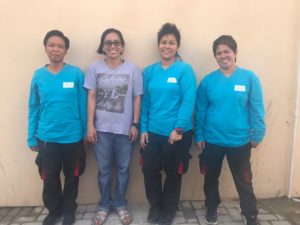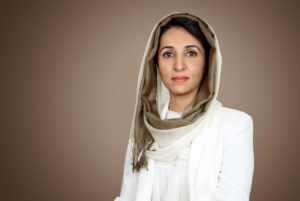Women in logistics
For our people issue, what would be a better topic than tackling the ‘Women in Logistics’ theme? What we learnt from this exercise is that more needs to be done to highlight the many ladies working hard in logistics. So this is the first of many articles to highlight the hard work and fervour of our ladies. Munawar Shariff has more

Global Supply Chain has gained three very different perspectives about the role women are playing in different aspects of the industry. We start with Baljeet Nagi, Director SCM Strategy ECEMEA at Oracle, UAE, who is at the helm of an initiative at her firm to create better and more opportunities for women to be encouraged to enter and stay in this industry. We spoke to the management at MARA Xpress about their women-only team of delivery couriers and Saima Ghafar, Senior Supervisor, Neovia Logistics Services, on her hard work and how she has finally created a satisfying role for herself and is raring to move forward in her career.
Baljeet Nagi, Director SCM Strategy ECEMEA at Oracle, UAE
Soon after graduating in Biology with a BSc Hons from a university in the UK, Baljeet Nagi realised her academic specialisation wasn’t the career for her. “I had no choice but to find work to support myself,” she says. The company she was working in, however, encouraged her to study Accountancy which she did and became, in due time, Financial Controller at a blue chip firm in the heart of London.
“After that, very soon I was head hunted by a software company to lead with ERP applications. I excelled in this role leading to various senior positions and did a lot of traveling across EMEA. Today after more than 21 years in IT, I am now a Strategy Director for SCM for ECEMEA at Oracle in Dubai,” Nagi continues. “All I would like to emphasize is if you have aspirations and goals, go for them. Your gender or background does not matter!”
Nagi says a mentor at an early stage of her career would have probably helped her realise her potential. “I would have spent some time analyzing my skill set and market opportunities. Having said that, I wouldn’t change the experience since that was a great learning opportunity.”
“The world we live in today is rapidly changing around us. Today is all about the Digital Autonomous Economy. My advice to someone wanting to start off in this field would be to be flexible and prepared to learn new skills, to embrace the digital world of new technologies and challenges.”
Nagi feels the importance of logistics and supply chain management has grown significantly and she suggests: 1. If you are thinking about a career change, the field of logistics has much to offer. 2. Jobs are available in logistics for people of all education levels. As the global economy has expanded, logistics has become increasingly important. 3. Careers in logistics are paying more than ever.
Logistics, she opines, is a stepping stone into the field of international business. Many people who begin a career in logistics find that they quickly gain enough experience with international business to develop new skills or confidently take on new opportunities. Opportunities for women are expanding in logistics. Logistics careers have traditionally been held by men, but women are becoming increasingly involved at all levels. And today, many women hold top positions in logistics companies and logistics departments, such as Nagi herself.
So while supply chain management (SCM) is still perceived to be a ‘masculine’ role. That is the one aspect of the role – a physical job involving warehouses, trucks etc., the other side to the roles is when SCM actually plays an important strategic part that reaches across functions and regions and requires skill sets that align with human strengths (both male and female fall under the category!) “Women should be encouraged to pick up skills in stem subjects – science, technology, engineering and maths,” she adds.
New college graduates are in high demand for entry level positions in the industry. Recruiting from engineering and tech programmes is a good place to start. Offering paid internships or scholarships to students majoring in supply chain management might also garner interest for students to pursue careers in the industry. Another good idea presented by Nagi is sending guest speakers to campuses who can explain the benefits of being part of the high-tech supply chain and logistics family, and how the industry is moving fast toward a brilliant future, which is hence a great way to foster excitement for a supply chain career path. There is currently a need for a programme like this to inform young people of the possibilities that the supply chain and logistics industry holds.
Leadership
A leader needs a high level of cultural and emotional intelligence but above all an awareness of one’s own values and vulnerabilities. Women are perceived as great social risk takers better at reacting to situations with greater emotional intensities than men are. Nagi says, “When confronted with uncertainty, women report fear whereas men report anger!!! Women, therefore, are better managers and leaders!”
And Nagi drives the point home by adding, “As per DDI Global Leadership Forecast 2014/2015, an organization performs better financially when more women are in leadership roles!”
Oracle Women’s Leadership programme
“I am the leader for Oracle Women’s Leadership programme (OWL) at Oracle in Dubai. OWL is a global initiative, and its mission is to develop, engage, and empower current and future generations of Oracle women leaders to foster an inclusive and innovative workforce. OWL is an important part of Oracle’s overall inclusion strategy, which is vital to maintaining a productive, dynamic global workforce, which strengthens Oracles’ leadership capabilities,” she adds.
Oracle is hiring hundreds of millennial employees annually through their new college grad programmes; these millennials are actively involved in the running of communities at the company’s various hubs; OWL provides an opportunity for them to connect with cross-generations to see career opportunities front and center. OWL Communities have a development focus with their many development programs, various mentoring opportunities and networking events.
In the UAE – Delivering the Oracle Cloud Internship Programme seminar at “Employer on Campus” Day at HCT Women’s Campus Abu Dhabi
In Saudi Arabia – Launched “female only” Oracle HCM and Financials Cloud workforce training with Prince Sultan University for 40 Saudi females as part of King Salman Education for Employment Initiative which will place trainees in jobs upon successful completion of the programme and 10 certified Saudi women on the Oracle Financial Cloud Implementation
In Kenya – Holds regular mentoring sessions for girls at the Nairobotics Korogocho Hope Centre. Organised programme where career talk is delivered via Oracle’s female Tech expert @ ‘Girls with Grits Hackathon’ aiming to encourage young ladies to develop and work on hardware and software projects.

Mara Express
Mara Express is a two-year-old, UAE-based courier delivery firm with a 12 member women’s delivery team besides their regular couriers. The team of women couriers are dedicated to delivery of high end luxury fashion as well as retail, cosmetics, FMCG and electronics.
Jeremy Skyrme, CEO, Mara Express says, “We currently have 12 women delivery experts spread across the UAE. There were several considerations to our hiring female drivers: the cultural aspect of this region, having female drivers can promote a better customer experience as it creates comfort and confidence for a woman receiving a package from a female driver. Also it adds a different flavor to the entire customer experience and our business. It also breaks the stereotype of only men being ‘delivery agents’.”
Mara Xpress believes in diversity within the company as well as giving an equal opportunity to all employees. All drivers undergo a week of immersion to inculcate company values and culture. Coaching sessions are also provided and is one of the main tools that helps them become better at their jobs.
“Women are resilient and patient by nature,” continues Skyrme, “important attributes to the type of business as different types of customers are encountered with each shipment delivery. “Also, women are able to build a rapport with customers faster than men. The attention to detail is one of the advantages of women drivers over male couriers.”
The company suitably rewards their employees to keep the motivation flowing and the morale upbeat. Incentives are awarded for achieving the key performance indicators (KPI) which is roughly an average of 40 deliveries per day, special campaigns are run during peak seasons when there are a high volume of deliveries, they have initiatives like Employee of the month, the X-tra Miler award as well as monetary and gift items. “A company must be able to adopt diversification and gender equality,” concludes Skyrme.

Saima Ghafar, Senior Supervisor, Neovia Logistics Services
Saima Ghafar is an industry veteran, she began her career in 2000 as a startup member at Caterpillar Logistics Services (now Neovia Logistics Services). She came on board fully after completing her BTech Computer Information systems the following year.
“My first job was in HR despite my efforts to get into the IT field. During those years, it was rare for women to get a real opportunity in IT in the region, almost like finding a needle in the haystack,” says Ghafar. So, after improving processes in HR for three years, she was able to get her break. Because the fact that she was able to improve processes in HR, enabled her to finish work a few hours earlier and she used her free time to create reports or do other admin roles for the warehouse. “This is how I entered the field of logistics. I had the opportunity to lead IT as well as Transportation (arranging trucks for outbound shipments etc),” she continues. Being Lean Six Sigma certified added to her superlative work and the maintenance of the requisite logistics standards
“Exposure to warehouse processes, inventory management, IT / SAP processes, project management and being a certified Green Belt gave me the edge to be given the opportunity to be a Senior Supervisor; with responsibility to handle warehouse operations including Transport and IT/IS departments,” she continues. “Another essential part of my job is to implement and sustain the Neovia Operating System in all Neovia facilities as this is an integral part of Neovia’ s culture,” says Ghafar.
Ghafar feels that the number of women has, very gradually, increased in the industry during the last 20 years. “In my 17 years of service, the number of women that I have met, in this field are just a handful,” she says.
The path is not so smooth for women in any part of the world. Despite the fact that most of multinational companies are strongly committed to gender diversity, it does take time for men to see and let women prove their capabilities; once that trust is established, however, there is no stopping them. Women remain underrepresented in all fields. Compared to men, fewer women are hired at entry level, despite women being about 60 per cent of the recent college graduates*.
The trend for women in this industry is upward but very slow. The rate of women leaving the workplace is less compared to men as they want to focus on family as well*. Dubai government has taken great initiatives for women in this field. An example is: at the opening of DP World’s Jebel Ali Container Terminal 3 in 2014, the demonstration of a remotely controlled quay crane during His Highness Sheikh Mohammed Bin Rashid Al Maktoum, Vice President and Prime Minister of the UAE and Ruler of Dubai’s, visit to the port was given by a woman crane operator. Out of 30 per cent of the new quay crane Emirati operators recruited, a third are women. In Europe and Americas, the number of women in this field is significant compared to Asian or Middle Eastern countries. Organizations must have a quota for women to be part of logistics and transport. This industry is growing rapidly and is one of the key contributors to a country’s economy. With women being a big part of the workforce, the opportunities are countless which any country or organization cannot ignore.
As per a survey conducted in 2015, women were only 10 per cent of the workforce in logistics and warehousing. “During my career, and being part of the recruiting activities, women were and still are always selected for HR and admin jobs. Women are always perceived to be carved only for jobs with soft skills. The slow but steady change is inevitable. The future will see a good number of women in transport & logistics but this is not possible without the support of men at senior levels. *2017 LeanIn.Org and McKinsey – Women in workplace study
Leadership
“I believe that women are hardworking and can excel in any field. Women generally have a very holistic approach towards any task they perform. People, safety, processes, company culture, all work in sync mentally for them. The natural maternal instincts of women makes them compassionate leaders. They do not just talk about bottom line, KPI’s or productivity but the Emotional Quotient plays heavily under their leadership. Empathy and understanding are a woman leader’s strength which make her more likeable and successful as a leader,” she says.
Stereotyping
Ghafar feels that the stereotyping – that women are not capable or suitable for the industry or for that matter any field, has to change. Women need as much support and trust to develop and grow as their male colleagues. “I am a great advocate of cross-functional training. This is a great tool that can be used by companies to bring out hidden talents. The idea that women cannot work in fields with physical hard work is already a proven myth but needs to be propagated. A change in perspective, skills and experiences is very important in organizational culture; these are the main factors that cause innovation and support creativity.
Organizational culture plays a big role, too. Bosses must be held accountable for the growth and development of their employees. This is imperative to fulfill organizational strategy. “I always say that if people have not grown / developed over a period of years or they have been doing the same work for years, their complete potential has not been realized OR that they have not been exposed to bigger challenges / additional responsibilities; which means that bosses have not acted or mentored their people as required. A boss is a first direct mentor to their people.
“My advice to anyone starting in this field is: keep an edge over the others by continuously learning and developing yourself. Your development is your priority. Make time to read and learn. Emotional Intelligence is one area that I would recommend which is not taught in any school or university. People are not machines, they are emotional and intellectual beings and they need to be respected and addressed in that manner,” Ghafar concludes.






